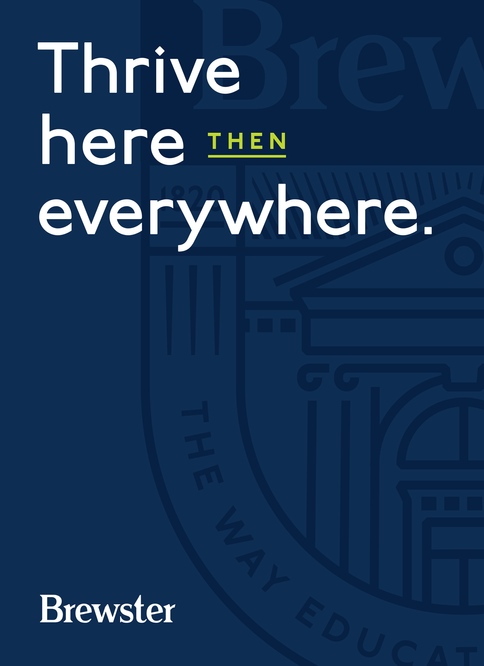

Ready, Set, Solve!
Brewster offers the full spectrum of college preparatory mathematics courses, ranging from Algebra 1 to Advanced Placement Calculus BC. Small class sizes, best teaching practices, and a combination of heterogeneous and homogeneous groupings create a highly effective learning environment in which teachers can meet the individual needs of students and help them grow their confidence, mathematical knowledge, and skills.
When a student realizes a concept can be found in their everyday world, that inspires me to keep doing what I'm doing— to keep showing kids that math can be fun.

Finding Angles in the Real World
At Brewster, we know the importance of seeing the real world application of what you’re learning—which is why geometry classes have been getting outside to map out steps around campus in order to learn how to decipher angles.
Mathematics Courses
Algebra 1
This course forms the foundation for all college preparatory mathematics courses. It acquaints students with basic algebraic concepts and their applications. Among the topics covered are real number properties, equation solving with one and two unknowns, rational expressions, polynomials, radicals, graphing, and problem-solving techniques. Students learn to describe the world around them with algebraic expressions, equations, and graphs. Applications, calculators, computers, and other manipulatives provide a context for the abstract language of algebra.
Geometry
This course builds on the student’s knowledge of algebra. It integrates standard approaches, coordinates, and transformations throughout, in both two and three dimensions. The course is designed to maximize the acquisition of geometry skills and concepts. Topics include lines and planes; similar and congruent polygons, circles, and spheres; basic trigonometry; and areas and volumes. Real-life situations motivate geometric ideas and provide the settings for practice of geometry skills.
Algebra 2
This course emphasizes facility with linear and quadratic forms, powers, roots, and the functions based on these concepts. Students study these relations and functions as tools for modeling real-world situations. The course builds upon the foundation laid in Algebra 1, extending concepts and underscoring the requisite skills needed to move forward into the realm of higher-level mathematics. The graphing calculator is also a major tool used during this course to enhance students’ understanding of each concept.
Functions, Statistics, and Trigonometry
This course is a post-Algebra 2 course designed for students who do not intend to take calculus. It underscores some key concepts of Algebra 2 and introduces students to trigonometry, logarithms, and conic sections. In addition, it includes an introduction to both probability and 14 statistics. The course is designed to be a more hands-on approach to mathematics, infused with frequent projects and lab activities. Scientific calculators and computer software are also major tools used within the course to enhance students’ understanding of each concept.
Pre-Calculus
This sequence of topics in higher mathematics synthesizes prior mathematical experience. The study of trigonometry is an integral part of this course, which also includes, but is not limited to, function properties, transformations, conics, exponential and logarithmic functions, polar equations, and sequences and series. Students must have a graphing calculator (TI-84 or better) to participate effectively amid challenging topics. Additional computer applications are also used to heighten understanding and further develop insight within the higher math concepts.
Topics in Calculus
Topics in Calculus is designed as a non-advanced placement exposure to college-level calculus. The study of topics is similar, but the pace and depth to which each is covered varies. Topics include limits, derivative techniques and applications, implicit differentiation, integrals, area and volume, and techniques of integration. Applied problems are drawn from a broad range of the natural sciences, engineering, and technology. Calculus is the mathematics of change, and this course will help students understand the changes that occur wherever there is motion or growth or where variations in one quantity produce alterations in another.
Statistics
This is a post-Algebra 2 course suitable for seniors or post-graduates. This full year math course is designed for students who are interested in data analysis. Most majors in college require some degrees of statistical understanding. This course should give a leg up to students who will be studying statistics at the college level. Topics include, but are not limited to, data sampling, descriptive statistics, probability, discrete random variables, normal distribution, confidence levels, hypothesis testing with one or two samples. A graphing calculator (TI-84 or better) is required.
Introduction to Computer Programming
In this introduction to computer programming course, students will not only learn key computing concepts and programming skills applicable to all languages, but they will also build fundamental iOS app development skills using the programming language Swift and the utilization of Swift Playgrounds. This course will provide students with practical experience developing apps as they explore some of the basic building blocks of all iOS applications, such as maps, tables, games, navigation, photos, and camera. Throughout the year, students will have the opportunity to modify existing programs as well as design and implement their own from the ground up.
Advanced Computer Programming
The Advanced Computer Programming course is designed to build upon the basic skill set obtained after taking any introduction to programming course. Students will cultivate their understanding of coding through analyzing, writing, and testing code as they explore concepts including variables, control structures, polymorphism, and object-oriented design and methodology using the Java programming language. Students will work individually and in 15 small groups on these topics and, although optional, this course will provide a solid preparation for the AP Computer Science A exam in the spring.
Advanced Placement Calculus (AB and BC)
This course is a rigorous exposure to college-level calculus, culminating with the Advanced Placement Examination in May. Topics in Calculus AB include limits, derivative techniques and applications, implicit differentiation, integrals, area and volume, and techniques of integration. Topics in Calculus BC include the entire AB curriculum accompanied by parametric, polar, and vector functions; analysis of planar curves; logistic differential equations; and polynomial approximations and series.










